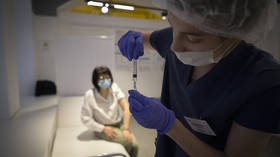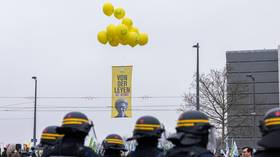Russian expert rubbishes Pfizer call for Covid jabs every 3 months

One of the team that developed Russia’s pioneering Sputnik V vaccine has hit out at US pharma giant Pfizer’s warning that Covid-19 jabs may be required every three months to protect against the virus.
“We don’t recommend that, and I don’t see the necessity,” Denis Logunov, a deputy director at the Gamaleya Institute, told RIA Novosti on Tuesday. “What Pfizer is publishing now looks like an advertisement for an unsold product, not proven research. For now, intermediate results are coming out, and it would be hasty to use them to justify the decision to vaccinate people en masse every three months.”
Studies published in October showed the Pfizer-BioNtech vaccine’s effectiveness at preventing infection dropped from 88% to 47% after six months. However, the same analysis also showed that the jab was still 90% effective at preventing hospitalization after the same interval of time.
Since then, booster shots of Pfizer’s vaccine have become widely available in the US and the UK. The firm recently released data showing that three doses appeared to provide good protection against Covid-19, even with the Omicron variant spreading, which scientists fear could be more contagious than previous strains and circumvent immunity.
Last week, however, the company’s CEO, Albert Bourla, told CNBC a fourth jab may eventually be required. He said he had previously thought a fourth would be required only after 12 months, but that Omicron may now necessitate earlier distribution. He emphasized that, as the Northern Hemisphere heads into winter, when immunity is naturally lower, “a third dose will give very good protection, I believe.”
Some experts have pointed out that Pfizer and other drug companies have a financial interest in selling more shots, arguing that the data shows vaccines remain effective at preventing serious cases of Covid-19 even after six months.
A comparative study of vaccines conducted between January and June showed that, after six months, Sputnik V vaccine was the most effective at preventing Covid-19 mortality, and second only to Moderna at preventing infection. However, despite being given the green light in more than 70 countries, it has not yet been approved by the World Health Organization, with Moscow citing bureaucratic hurdles.














